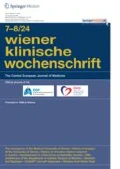Summary
Objective
To compare the impact of induction of labor at 38 weeks of gestation with the induction of labor at 40 weeks of gestation in women with insulin-treated gestational diabetes on maternal and fetal outcome.
Study design
In this study 100 pregnant women with insulin-treated gestational diabetes were randomized to either induction of labor at 38 (group I) or 40 weeks (group II) to evaluate the rate of large for gestational age newborns, neonatal hypoglycemia, success rate of deliveries within 48 h and cesarean section rate after induction in both groups.
Results
The difference of large for gestational age newborns was not significant between the two groups (6.8% vs. 12.8%, p = 0.49), 16 (36.4%) newborns in group I and 8 (17.0%) newborns in group II developed hypoglycemia <35 mg/dl (p = 0.04). The success rate for deliveries within 48 h after induction of labor for groups I and II was 77.3% and 92.3%, respectively (p = 0.25). The cesarean section rate after induction of labor was not significantly different between the two groups (24.1% vs. 18.7%, p = 0.49).
Conclusion
In a cohort of women with insulin-treated gestational diabetes, induction of labor at 38 weeks did not significantly reduce the rate of large for gestational age newborns compared to induction at 40 weeks but seems to increase the rate of neonatal hypoglycemia.

Similar content being viewed by others
References
American Diabetes Association. Gestational diabetes mellitus. Diabetes Care. 2004;27(Suppl 1):S88–S90.
American Diabetes Association. Gestational diabetes mellitus. Diabetes Care. 2014;37(Suppl1):S81–S89.
HAPO Study Cooperative Research Group. Hyperglycemia and adverse pregnancy outcomes. N Engl J Med. 2008;358:1991–2002.
Ignell C, Claesson R, Anderberg E, Berntorp K. Trends in the prevalence of gestational diabetes mellitus in southern Sweden 2003–2012. Acta Obstet Gynecol Scand. 2014;93:420–4.
Landon MB, Spong CY, Thom E, et al. A multicenter, randomized trial of treatment for mild gestational diabetes. N Engl J Med. 2009;361:1339–48.
Crowther CA, Hiller JE, Moss JR, McPhee AJ, Jeffries WS, Robinson JS. Effect of treatment of gestational diabetes mellitus on pregnancy outcomes. N Engl J Med. 2005;352:2477–86.
HAPO Study Cooperative Research Group. Hyperglycemia and Adverse Pregnancy Outcome (HAPO) study: associations with neonatal anthropometrics. Diabetes. 2009;58:453–9.
Pedersen J. Diabetes and pregnancy: blood sugar of newborn infants. Ph.D. thesis. Copenhagen: Danish Science Press; 1952.
Gluckman PD, Pinal CS. Regulation of fetal growth by the somatotrophic axis. J Nutr. 2003;133:1741S–1746S.
Lai FY, Johnson JA, Dover D, Kaul P. Outcomes of singleton and twin pregnancies complicated by pre-existing diabetes and gestational diabetes: a population-based study in Alberta, Canada, 2005–2011. J Diabetes. 2016;8:45–55.
Christoffersson M, Rydhstroem H. Shoulder dystocia and brachial plexus injury: a population-based study. Gynecol Obstet Invest. 2002;53:42–7.
Jensen DM, Sorensen B, Feilberg-Jorgensen N, Westergaard JG, Nielsen H. Maternal and perinatal outcomes in 143 Danish women with gestational diabetes mellitus and 143 controls with a similar profile. Diabet Med. 2000;17:281–6.
Sutton AL, Mele L, Landon MB, et al. Delivery timing and cesarean delivery risk in women with mild gestational diabetes mellitus. Am J Obstet Gynecol. 2014;211:244.e1–244.e7.
Diabetes in pregnancy: Management of diabetes and its complications from pre-conception to the postnatal period. www.nice.org.uk/guidance/cg63. Zugegriffen: 2008.
Committee on Practice Bulletins – Obstetrics. Practice Bulletin. No. 137 Gestational diabetes mellitus. Obstet Gynecol. 2013;122:406–16.
Witkop CT, Neale D, Wilson LM, Bass EB, Nicholson WK. Active compared with expectant delivery management in women with gestational diabetes: a systematic review. Obstet Gynecol. 2009;113:206–17.
Kjos SL, Henry OA, Montoro M, Buchanan TA, Mestman JH. Insulin-requiring diabetes in pregnancy: a randomized trial of active induction of labor and expectant management. Am J Obstet Gynecol. 1993;169:611–5.
Kautzky-Willer A, Bancher-Todesca D, Birnbacher R. Gestational diabetes mellitus. Acta Med Austriaca. 2004;31:182–4.
International Association of Diabetes and Pregnancy Study Groups Consensus Panel, Metzger BE, Gabbe SG, Persson B, et al. International association of diabetes and pregnancy study groups recommendations on the diagnosis and classification of hyperglycemia in pregnancy. Diabetes Care. 2010;33:676–82.
Voigt M. Methodische Aspekte der Berechnung von Normwertkurven für das Geburtsgewicht. 120. Tagung NGGG, Poster 50, Rostock. vol 50. 2004.
Hosmer DW, Lemeshow S. Applied survival analysis: regression modeling of time to event data. New York: John Wiley & Sons; 1999.
Metzger BE, Buchanan TA, Coustan DR, et al. Summary and recommendations of the fifth international workshop-conference on gestational diabetes mellitus. Diabetes Care. 2007;30(Suppl 2):S251–S260.
Rosenstein MG, Cheng YW, Snowden JM, Nicholson JM, Doss AE, Caughey AB. The risk of stillbirth and infant death stratified by Gestational age in women with GDM. Am J Obstet Gynecol. 2012;206:309.e1–309.e7.
Funding
This research work was performed in a University hospital, with no special funding.
Author information
Authors and Affiliations
Corresponding author
Ethics declarations
Conflict of interest
K. Worda, D. Bancher-Todesca, P. Husslein, C. Worda, and H. Leipold declare that they have no competing interests.
Ethical standards
The authors assert that all procedures contributing to this work comply with the ethical standards of the relevant national and institutional committees on human experimentation and with the Helsinki Declaration of 1975, as revised in 2008.
Rights and permissions
About this article
Cite this article
Worda, K., Bancher-Todesca, D., Husslein, P. et al. Randomized controlled trial of induction at 38 weeks versus 40 weeks gestation on maternal and infant outcomes in women with insulin-controlled gestational diabetes. Wien Klin Wochenschr 129, 618–624 (2017). https://doi.org/10.1007/s00508-017-1172-4
Published:
Issue Date:
DOI: https://doi.org/10.1007/s00508-017-1172-4


